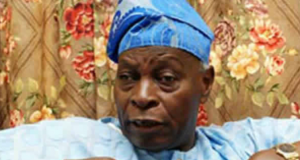
Former Secretary to the Government of the Federation and Minister of Finance, HRM Oluyemi Falae (CFR), has defended his role in Nigeria’s Structural Adjustment Programme (SAP), describing it as the least harmful option available at the time to address the country’s severe debt crisis.
In an interview on ARISE News on Thursday, Falae rejected widespread claims that he masterminded SAP, clarifying that the policy was already in place before his appointment under General Ibrahim Babangida’s regime.
“I was appointed secretary to the federal government on the 29th of January 1986. Six weeks before that, Babangida announced… that his government had adopted a domestic structural adjustment program. That policy was already government policy by the time I was appointed. I did not bring the policy, I did not recommend it, I did not make it,” he said.
Falae explained that SAP emerged as a response to Nigeria’s deteriorating economic conditions, worsened by what he described as excessive import licensing and foreign exchange mismanagement under President Shehu Shagari’s administration, which left behind an estimated $30 billion in trade arrears.
“We were in debt. We had no choice but to pay the debt back. And we could not impose our solution on the international community. So they had us by the throat,” he said.
“If we did not do a deal with the creditors, we would stop trading internationally… Nigeria would be in crisis. So it was not a pleasant thing. It was the least bad of all the bad options available.”
Responding to criticisms that SAP triggered long-term economic decline and hardship, Falae argued that the programme was initially stable and delivered some positive reforms.
“By the time I left government in 1990… the exchange rate was 5.50 Naira to the Dollar after three years of SAP,” he noted. “It was after that we began to have 32 naira to the dollar, 48 naira to the dollar, 100 naira.”
He highlighted the benefits of the policy, including liberalized marketing for agricultural products and the introduction of domiciliary accounts.
He said: “One of the positives was the reform of the marketing policy system… which was very good for the farmers. And also, the positive of the domiciliary account… I believe the balances in those domiciliary accounts in Nigeria would be in the neighborhood of $35 billion.”
When asked to compare SAP with current economic reforms under President Bola Tinubu—such as foreign exchange liberalization and fuel subsidy removal—Falae emphasized the need for a balanced approach to economic policy.
“You see, our problem has been abuse. And, you know, we can never surrender the economy to blind market forces. At the same time, you cannot oust market forces from the determination of economic parameters,” he said.
“You have to have a balance between government intervention and the working of market forces. So that is the path of wisdom.”
Falae reiterated that while SAP had its challenges, its implementation during his tenure was measured and did not result in the runaway inflation or devaluation seen in later years.
“When I was there… that was to allow market forces, as well as government intervention to manage the economy. And it was, in my view, an acceptable system. But as I said, I can’t answer for the period when I was not in government,” he concluded.
The post Olu Falae Defends SAP, Blames Shagari-Era Debt For 1986 Economic Crisis appeared first on Naija News.


